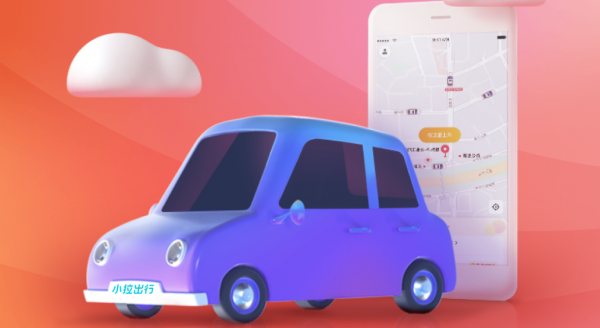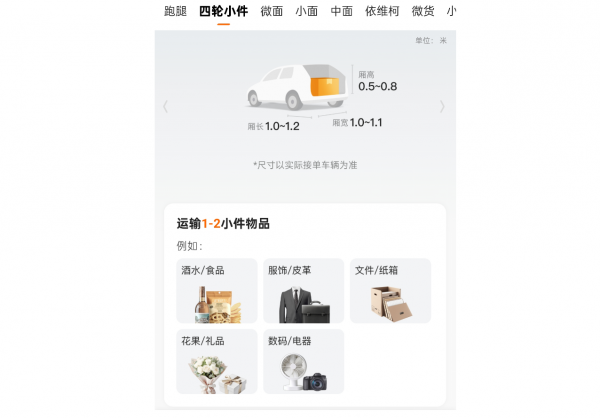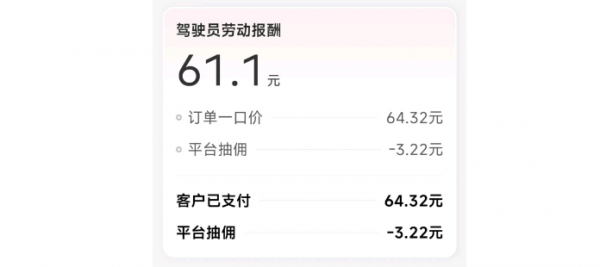Xiaola Travel: The "Pinduoduo of Ride-Hailing" Takes Flight. Is Didi Feeling the Heat?
![]() 06/10 2025
06/10 2025
![]() 743
743
Overworked ride-hailing drivers are eagerly seeking a new savior.

In the fiercely competitive ride-hailing market, where the landscape appears almost set, a new player has emerged.
Recently, multiple media outlets reported that after a lengthy period of market penetration, a ride-hailing platform named "Xiaola Travel" has suddenly gained popularity in lower-tier cities, standing out with its "fixed price," "commission as low as 1%," and "driver hall order-grabbing" models.
The "fixed price, pay first, ride later" model ensures that passengers avoid most potential disputes before the trip begins, while the ultra-low commission rate attracts more full-time or part-time drivers to join.
Additionally, Xiaola Travel, which is not exclusive, has become a "plan B" for many ride-hailing drivers. According to Huxiu, the operation head of Xiaola Travel said they are not concerned about drivers viewing it as a "part-time" platform.
"Drivers can spend most of their time driving for Didi or Gaode and then do part-time work with Xiaola. This way, they can more efficiently utilize their time and increase their income per unit of time. The income of drivers from orders on both platforms will naturally increase. Our platform positioning has never been to compete for the industry's top spot or even monopolize, but to provide drivers with more supplementary income channels," said the operation head of Xiaola Travel.
So, who exactly is Xiaola Travel? Does the real situation represent a new hope for the industry, as claimed in many promotional materials?
1
Xiaola Travel = Huolala + Didi?
Xiaola Travel is not an unknown entity, but its background story begins with Didi.
On July 2, 2021, the Cyberspace Administration of China announced the initiation of a cybersecurity review of "Didi Chuxing." The announcement stated that a cybersecurity review would be conducted on "Didi Chuxing," and new user registrations would be suspended during the review period. Didi responded that it would actively cooperate with the cybersecurity review.
Prior to the review, Didi, which was almost monopolizing the ride-hailing market, began to test the waters in the freight business, directly encroaching on the core business of Huolala, the then-leading freight industry player. In response to Didi's challenge, Huolala launched "Xiaola Travel" and officially entered the ride-hailing market.
Although Xiaola Travel was launched after Didi underwent the review, there were still a series of second- and third-tier ride-hailing platforms, and market competition remained fierce. The period when Didi was absent did not become a true window of opportunity, and Xiaola Travel failed to stand out, instead gradually becoming less noteworthy.
However, since Huolala intended to layout the travel market, it would not easily abandon the Xiaola Travel platform.
In fact, after its launch, Xiaola Travel has been continuously trying and exploring a development path suitable for itself. However, faced with fierce industry competition and a ride-hailing market where user habits have stabilized, simply copying the models of platforms like Didi is obviously not enough to break through. It is against this backdrop that Xiaola Travel began to rely on Huolala's deep accumulation in the freight sector and explored a travel service mode closely integrated with freight.
More specifically, Xiaola Travel's main focus shifted from "transporting people" to "transporting goods."
When opening the Huolala order page, in addition to the larger van and truck options needed for freight and moving, there is an optional service called "four-wheel small items" in the errand options. Its main transportation products include small items such as food, clothing, documents, gifts, and small digital appliances, and it is Xiaola Travel that provides this service.

From the results, Xiaola Travel has indeed addressed the pain points of many users. Many customers with needs find that the goods they need to transport fall into the range of "too large for an electric bike, too wasteful for a van." At this time, Xiaola Travel effectively fills this market gap.
In addition, although Xiaola Travel officials stated that their Huolala and Xiaola Travel are independent brands, Xiaola Travel was originally a startup project by former Huolala employees. The business essence naturally inherited that of Huolala. Furthermore, several institutional investors of Huolala subscribed to Xiaola's pre-A series preferred shares in February 2023, so the "fixed price" model was also inherited, winning recognition from a large number of part-time drivers in the following years.
Meanwhile, as Xiaola Travel gradually established a good reputation among drivers and consumers within the "body" of Huolala, it did not forget that it is actually a ride-hailing platform. It also brought the "low commission" and "fixed price" strategies from the freight sector to the ride-hailing sector.
So, why has Xiaola Travel, which has been relatively unknown for many years, suddenly become highly active in consumers' eyes since April?
A bigger possibility is that Xiaola Travel recently adjusted its strategic focus, restarted its previously relatively low-key ride-hailing business, and conducted considerable promotional efforts, bringing the name of Xiaola Travel back into consumers' view.
In this regard, Xiaola Travel customer service also confirmed to Xinshi Research Institute that the Xiaola Travel platform has been continuously growing, and the order coverage area is gradually expanding.
In other words, Xiaola Travel is essentially a "dual-purpose platform" derived from Huolala that can both deliver goods and transport people. Orders placed on Huolala are for goods delivery, while orders placed on Xiaola Travel are no different from general ride-hailing platforms.
However, such a "dual-purpose platform" has received recognition from both consumers and drivers.
There is no need to elaborate on the consumer side; the combination of affordability and fixed prices is enough to attract a significant number of passengers. On the driver side, since the platform does not strictly differentiate between transporting people and goods and does not implement an order-dispatching system, drivers can fully choose whether to transport people or goods.
Even more freely, Xiaola Travel customer service told us that as long as drivers have the relevant licenses, drivers registered with Xiaola Travel can achieve "transporting goods on one order and transporting people on the next."
It can be said that Xiaola Travel, with its unique "dual-purpose platform" model, has successfully found its footing in both the ride-hailing and freight markets. Currently, it is gradually eroding ride-hailing market share through flexible service models and preferential pricing strategies.
2
Behind Xiaola Travel's sudden popularity: The platform's commission rate is much lower than that of Didi and Gaode
However, although Xiaola Travel has attracted the attention of many users and drivers in a short period of time with its "fixed price," "low commission," and "dual-purpose platform" models, seemingly injecting new vitality into the ride-hailing market, some details have gradually emerged during actual operation.
For example, the order-grabbing model that Xiaola Travel was born with has both positive and negative aspects.
On the positive side, the rule of determining order ownership through order-grabbing provides more freedom, and drivers do not have to worry about being assigned so-called "bad orders," enhancing the driving experience.
However, on the negative side, as long as there is "grabbing," there will inevitably be drivers who cannot grab orders.
Li Dan, a Xiaola driver in Wuhan, told us, "Xiaola is not as easy to run now. With fewer orders, it's easy to miss out. If you can't grab a suitable order, you have to run those not-so-good ones. Mainly because there are more and more people running it now, and some ride-hailing drivers are also coming to run Xiaola, but it still depends on whether you can grab the order."
Hu Lu, a driver from Zhejiang, also told us, "It's indeed much harder to grab orders now. I often encounter situations where more than ten people compete for one order. Once, I was only one kilometer away from the order but still didn't grab it. Is that reasonable?"
Behind the ultra-low commission rate of 1% are orders with even lower prices.
Compared to the national average commission rate of 22% for leading domestic platforms and 20% for mainstream aggregation platforms, Xiaola Travel's commission rate is indeed not high. Member drivers have a maximum commission rate of 10% based on different levels, while non-members have a maximum of 20%.
Lei Lin showed us a screenshot of his order. Compared to the price of 64.32 yuan, the commission of 3.22 yuan is indeed less than 5%, far lower than any ride-hailing platform on the market. According to him, for the price of 64.32 yuan, considering the distance to pick up the passenger, Xiaola's commission rate per kilometer is even less than 1 yuan, which is lower than the prices offered by other platforms.

In other words, although the platform's commission rate is not high, the reduced commission is not fully subsidized to drivers. It even feels more like both the platform and drivers are subsidizing consumers.
And if you encounter some weird ordering customers, Xiaola drivers will have an even harder time.
Li Dan told us that many customers do not just need to transport small items but place orders meant for small vans with them to save money. "A few times, my trunk and back seat were full, and some people asked me to transport dangerous goods like paint and aquatic products or goods with strong odors. Some of them I really didn't want to or couldn't transport, but often if I refuse an order, not only will I have made a trip for nothing, but the platform will also blame it on us."
What's even worse is that many orders named for freight will always have one, two, or even three people come to "escort" the goods. "I've encountered it a few times before. It's not really a delivery order; it's just a few people using the pretext of delivery to send their things because it's cheaper. If caught, it's also a big problem," said Li Dan.
In other words, Xiaola Travel drivers are not as wonderful as many people describe, and they also encounter many troubles. However, compared to professional ride-hailing platforms, it is much less stressful.
Apart from the driver side, during our communication with Xiaola Travel drivers, we found that a large proportion of them combine Xiaola Travel with ride-sharing.
Liu Ling, a "part-time" driver in Wuhan, told us, "If you only run Xiaola or only run ride-sharing, your earnings won't go up. You have to see if there are suitable ride-sharing orders after accepting an order. For me, the earnings from the two platforms are about half and half."
However, regarding this cross-platform order-combining situation, we also consulted Xiaola Travel's customer service. They said that although the platform does not mandatorily require drivers not to run other platforms, Xiaola also does not support ride-sharing, which stands in opposition to the common ride-sharing situation on Xiaola Travel.
It can be said that although Xiaola Travel's model has been established, there are still many areas that need to be polished when delving into specific businesses. It is not a simple and easy part-time job that allows for easy money-making.
3
Final Thoughts
Xiaola Travel, with its unique models of "fixed price," "commission as low as 1%," and "dual-purpose platform," has found a place in both the ride-hailing and freight markets.
However, market competition has never ceased, especially the pressure from Didi is gradually emerging.
Just as Xiaola Travel is trying to regain attention through its ride-hailing business, Didi has not stopped expanding either. Didi Freight has also been vigorously deploying the "four-wheel small items express delivery" business in recent years, which is Xiaola Travel's "base camp."
With Didi's encroachment, the market space occupied by Xiaola is likely to be further eroded. Facing such a resourceful and user-base-rich competitor, if Xiaola wants to defend its existing achievements and seek greater development, it must accelerate its pace and expand its scale to seize more market share.
Therefore, Xiaola Travel's high-profile offensive is, to some extent, also a behavior out of necessity.
However, regardless of how the external environment changes, "fixed price" and "low commission" remain the most distinctive labels of Xiaola Travel and its core competitiveness in attracting users and drivers. Although these two "gold medals" facing consumers and drivers are in place, what determines how far Xiaola Travel can go still depends on comprehensive factors such as service quality, user experience, and platform governance capabilities behind it.
Editor: Ding Li






